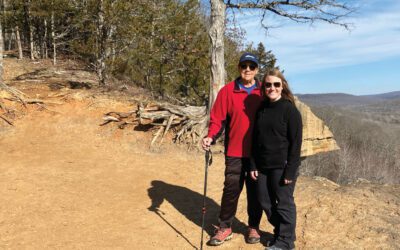A Welcome Face, A Familiar Voice
If Fort Smith were ever to open a museum of media, it would do well to install Daren Bobb as its curator. For thirty-eight years, the Illinois native has lent his talents to not one, but two important forms of mass communications: radio, which brought him to the Fort Smith market, and television, which has helped keep him here. It’s a tenure even he has to stop and ponder at times.
“When I first came here, the professor at school said, ‘You stay there a year or two and then maybe you’ll want to move on,’” he says with a hearty chuckle. “Well, I stayed a year and then got married and then my wife got a teaching job. Fort Smith became it; we weren’t going anywhere.
“I always tell people I don’t know how to do anything else. If the TV station shut down or the radio station shut down, I wouldn’t know what I would do. This is natural and I’m very comfortable in what I’m doing.”
Few of us are fortunate enough to wind up exactly where we always wanted to be, but Daren is one of those people. Bitten by the radio bug in high school, he decided early on he wanted to be on the air.
“When I was sixteen, I got involved with Junior Achievement, which teaches kids about business and careers,” he says. “One of the businesses in my hometown of about 13,000 was a radio station. Basically, one night a week we got to run the radio station, with supervision.”
Daren was so taken with the medium, he remembers wanting to record a demo tape on the spot. Instead, he graduated from the College of Broadcast Journalism at Lewis and Clark College in Godfrey, Illinois, during which time he made a fateful contact.
“The teacher at broadcasting school had worked at KTCS in Fort Smith,” he says. “He suggested I get a tape together and send it down. I did, and two weeks later, I moved to Fort Smith and started a job at KTCS in the news department.”
Radio news was very different in the mid-1980s than it is today. With no such thing as internet – or even cable, in many communities – local radio and TV were largely on par with each other as far as immediacy of reporting and reach. Daren was immediately thrown into the deep end of covering news in a town much larger than where he’d grown up.
“We were the only four-person radio newsroom in Fort Smith at the time and our biggest competition was the TV stations,” he says. “I would go cover everything – accidents, fires, court meetings, city council meetings, political rallies. I’d learned how to do all that in school, but you don’t ever know exactly how to handle something until you’re thrown into it.
“You just kind of let your instincts take over and with what you learned in school, you do the best you can. But compared to where I’m from to here, oh my gosh, it was a huge world of difference.”
One of the first big stories for the cub reporter was a wintertime plane crash seven months after he’d arrived that killed a man and his son. The next summer brought a tragic fire in downtown Van Buren caused by a truck barreling down a hill and ramming a station wagon. The wreck killed nine people and set ablaze three downtown businesses.
Another standout story from the early days was the trial of R. Gene Simmons, a spree killer and mass murderer convicted of shooting or strangling seventeen family members and a couple of non-relatives in 1987.
But it wasn’t all death and gloom, as Daren is quick to point out.
“You’d also get to cover the really cool things like a business opening or a parade, it was a wide range of things,” he says. “Fort Smith was a town four times bigger than where I grew up with maybe ten times the things going on.”
All in all, Daren came to see his work as a great adventure where no two days were the same and the big story was always right around the corner. He loved radio, but as the 1990s dawned he could see it starting to fade among the public.
“You could kind of see the writing on the wall that radio news wasn’t going to be what it was when I first started in it,” he says. “The station had scaled back to two people and there just wasn’t a lot of emphasis on doing local news. Maybe it was a generational thing; people weren’t listening to radio for news, they wanted to hear music and that’s it.”
It was here Daren took his first dip into television, leveraging a relationship he had with Channel 5. He came aboard as the six o’clock producer and de facto newsroom manager, a job he held for nine years until an old flame whispered to him.
“About that time, talk radio started taking off,” he says. “KWHN in Fort Smith needed somebody and so they let me come over there and work for six years with one of my best friends, Gary Elmore, who’s since passed away.
“Gary and I had a four or five-year run on KWHN. We would do six to nine every morning; three hours of he and I and news and sports and some traffic here and there. We would have guests every day and it was very issue oriented. We just had a ball with that. It was so much fun.”
Given the success of the show Daren wasn’t looking to change mediums again, but when his former employer lost its anchor, Channel 5 came looking for him.
“The news director at Channel 5 said, ‘Why don’t you come over and see me?’ I said, ‘Why?’ He said, ‘I want you to test,’” he recalls. “I said, ‘Look, I’ve always said I’m way better off behind the camera than in front of it.’”
Nonetheless, he read well enough to land the job and since 2006, he’s never looked back. All these years later, he finds himself in another media revolution – the era of clickbait and the almighty blog – but it feels less existential than last time.
“It is amazing how much it has changed, but it really hasn’t,” he says. “It’s kind of hard to explain but, especially in this market, I think we still have a core audience that watches TV. I’ve heard stories in larger markets that stations are doing a lot of things online only and that’s the only way they know how to compete. In our market, when we don’t do something on TV and it’s online only, we hear about it.
“At the same time, we have a huge presence online. Now, I’m old school, and most people my age were dragged kicking and screaming into this, but once you see it, it’s amazing. I’ve been able to adapt; there’s not very many older people at the station, I think I might be the oldest one.”
Age has its privileges, even in the notoriously fickle realm of television. Today Daren finds himself mentoring people on staff, offering advice and experience only years in the business can instill. At its heart, he tells the youngsters, the principles of the job have never changed, even as formats and technology have.
“I think it all comes down to us still covering both sides of the story,” he says. “Any journalist who’s been in the business for a while knows that you just have to, or you lose your credibility. The ones who’ve been in business for a while understand that while the younger reporters, I think they get it, but I don’t think they fully grasp the importance of that. But that has been the case since Day One.
“As for the actual news product itself, I think it has to be concise and very easy to understand, but more importantly, factually correct. Those are also things that have been consistent here. I think that’s Journalism 101 and I would hate to see that go anywhere.”
Watch Daren Monday through Friday at 4:00, 5:00, 6:00 and 10:00 p.m. on KFSM Channel 5 News.




